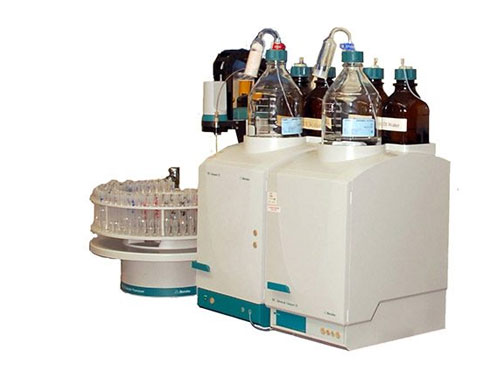
IC Analysis Services
ION CHROMATOGRAPHY SERVICES
Ion Chromatography (IC) is a powerful analytical technique that uses an ion exchanger to quickly and accurately distinguish between different types of ions and polar molecules.
Ion Chromatography can be incredibly useful in analyzing charged molecules, from massive proteins to small nucleotides and amino acids.
IC Testing helps to identify, quantify and separate ions in complex mixtures. Some of its uses are measuring pollutants in drinking water, identifying additives such as sugar or salt content within food products, and assisting in biological applications like DNA sequencing.
IC Testing Process
VARCHU MARC LLP IC Testing lab measures concentrations of ionic species by separating them based on their interaction with a resin. Ionic species separate differently depending on species type and size.
The IC Testing process permits the dynamic separation and detection of anions in an aqueous solution.
Types of IC Testing
The two types of ion chromatography are anion-exchange and cation exchange.
With cation exchange chromatography, positively charged molecules can be successfully isolated. Similarly, anion exchange chromatography allows researchers to accurately separate negatively charged molecules – providing two effective avenues for targeted separation.
Industries that use IC Testing
IC Testing is employed in various applications, ranging from the clinical utility field to industrial uses and pharmaceutical drug development. It has proven especially useful for protein purification, water analysis, and quality assurance processes.
Why Choose VARCHU MARC LLP Labs for Ion Chromatorgraphy Services
IC Testing is employed in various applications, ranging from the clinical utility field to industrial uses and pharmaceutical drug development. It has proven especially useful for protein purification, water analysis, and quality assurance processes.
IC Testing of Halogens and Ions in Aqueous Solutions
During IC Testing, aqueous samples are introduced. Then, components with a higher affinity are retained longer than those with little or no affinity. A detector at the end of the IC Testing column measures the eluate as it exits the column.
Different molecules within that sample interact with the column differently, allowing us to measure and study each one specifically. With IC Testing, we can detect various analytes without having them mix together.
In short: IC Testing offers precise insights into complex samples.
IC Testing can measure concentrations of major anions and cations in the parts-per-billion (ppb) range. Below is a list of commonly measured analytes.
Analytes Measured During IC Testing
- Fluoride (F-)
- Chloride (CI-)
- Bromide (Br-)
- Nitrate (NO2-)
- Nitrite (NO3-)
- Sulfate (SO4-2)
- Phosphate (PO4-3)
- Iodide (I)
- Acetate (CH?COOH)
- Formate (CH?O?)
CHEMICAL COMPOSITION ANALYSIS SERVICES
- Alloy Chemistry
- Antimony Analysis (ICP)
- Cadmium Analysis (ICP)
- Carbon, Sulfur, Hydrogen, Oxygen & Nitrogen
- Contaminant/ Corrodent Analysis
- Filler/Additive Analysis
- FTIR
- Contamination ID
- Halogen Analysis (IC)
- Heavy Metals Analysis
- Hex Chrome (UV-VIS)
- ICP-AES Analysis
- ICP-MS Analysis
- Impurities Analysis
- Ion Chromatography
- Material Certification
- Metal Purity
- OES Analysis
- On-site PMI
- PMI Testing (Positive Material ID)
- Particle Size Analysis
- Percent Crystallinity
- pH
- Polymer Testing
- Powder Diffraction
- Powdered Metal Analysis
- Precious Metal Assay
- Quantitative Analysis
- Resistivity (ASTM D1125)
- SEM-EDS
- Semi-Quantitative Analysis
- Trace Element Analysis
- Unknown Alloy Identification
- Unknown Material Identification
- XRD Analysis
- XRF Analysis
